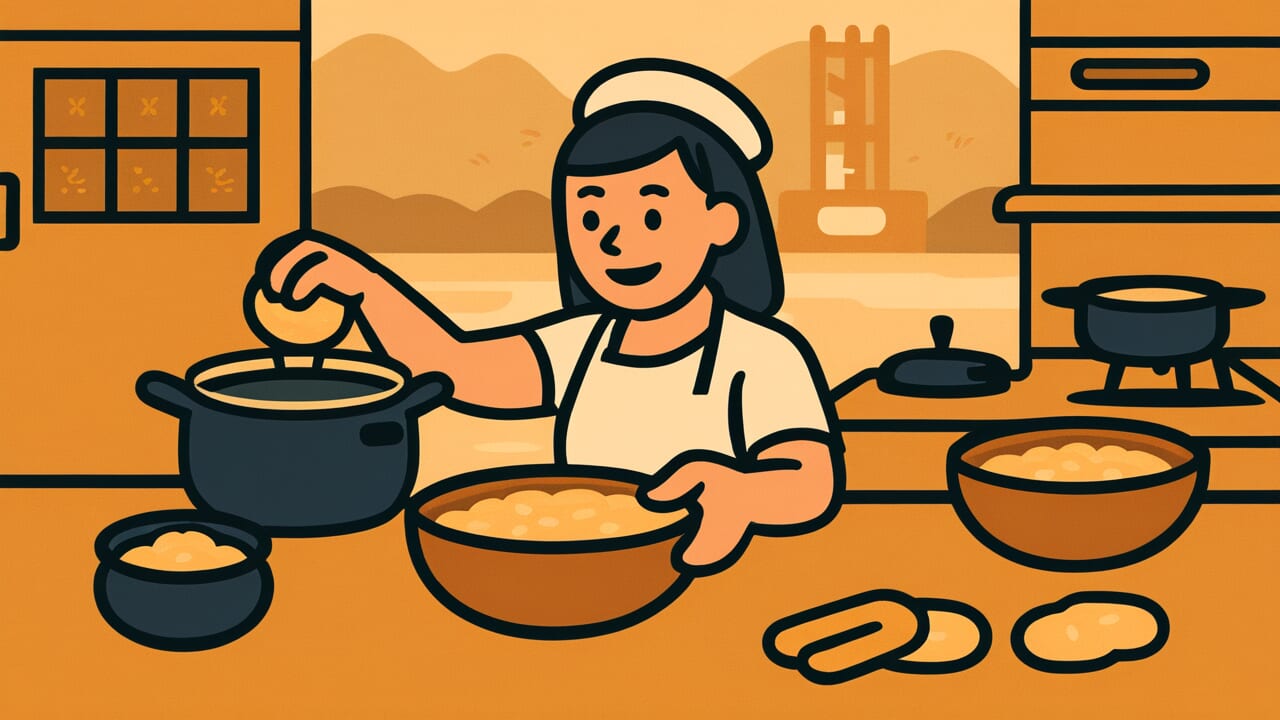How to Read “Count the rice grains before cooking”
Kome wo kazoete kashigu
Meaning of “Count the rice grains before cooking”
“Count the rice grains before cooking” is a proverb that warns against being overly stingy and petty in your approach to things.
This proverb criticizes a state where frugality has crossed the line into miserliness.
Counting rice grains one by one before cooking certainly shows an attitude of avoiding waste. But being this meticulous actually wastes other resources like time and effort.
This saying is used when someone is acting excessively cheap or stingy.
For example, it applies when someone loses a big opportunity by being unwilling to spend a small amount of money. It also fits situations where overly detailed management makes overall efficiency worse.
In modern times, cost reduction and efficiency are highly valued. Yet this proverb serves as a warning that “excessive frugality defeats its own purpose.”
What matters is finding the right balance in deciding what to protect and what to spend.
Origin and Etymology
The exact first appearance of this proverb in literature has not been identified. However, it likely originated from how rice was handled in Japanese farming communities.
For Japanese people, rice was not just food. It was precious property that even served as currency.
Rice was paid as annual taxes, given as salaries, and formed the foundation of people’s livelihoods. Naturally, treating rice carefully was expected.
However, this proverb warns against taking this “careful treatment” too far.
Counting rice grains one by one before cooking does show an attitude of avoiding waste. But actually doing this makes the time and effort required for cooking enormous.
The time spent counting rice could have been used for something more productive.
Behind this expression lies the wisdom of recognizing the boundary between frugality and stinginess.
Precisely because rice was precious, handling it required appropriate balance. This teaching reflects practical wisdom cultivated in farming communities.
Management that is too detailed actually harms overall efficiency.
Usage Examples
- He manages the company like counting the rice grains before cooking, so talented employees keep quitting
- Enduring without heating to save a few yen on electricity is like counting the rice grains before cooking
Universal Wisdom
The proverb “Count the rice grains before cooking” teaches us about the human instinct to protect what we have. It also shows the danger when that instinct runs wild.
We all have a desire not to lose what’s precious to us. Money, time, resources, and peace of mind.
Trying to protect these things is a natural attitude for living. However, when this protective stance becomes too strong, people lose sight of their original purpose.
What’s interesting is that this proverb doesn’t say “don’t save.” Valuing rice itself is not criticized.
What’s being warned against is the “method” of counting meticulously. In other words, even if the goal is right, it’s meaningless if the means aren’t appropriate.
This shows a deep understanding of human nature.
Why do people fall into such excessive behavior? It’s because of anxiety.
Fear of losing things clouds rational judgment. Behind the feeling of not wanting to waste even one grain of rice lies anxiety about the future and fear of losing control.
This proverb has been passed down through generations because this human trait doesn’t change across time.
In abundance or in poverty, people always have the potential to fall into the trap of “over-protecting.”
When AI Hears This
Looking at the act of counting rice through information theory reveals surprising waste.
For example, three cups of rice contain about 45,000 grains. Counting them one by one certainly gives accurate information, but the measurement cost is enormous.
Information theory always weighs the “measurement cost” of obtaining information against the “value” that information brings.
From a Shannon entropy perspective, the amount of information needed for cooking rice is surprisingly small.
To decide the water amount, low-resolution information like “about three cups” is sufficient. The number of bits needed is extremely small.
Meanwhile, accurately counting 45,000 grains requires about 16 bits of information. But that precision barely affects the cooking result.
In other words, most of the high-precision information obtained at high cost gets discarded as “noise” in decision-making.
The same principle works in modern machine learning. Image recognition AI doesn’t use complete information from millions of pixels.
It judges using only compressed features. Self-driving cars don’t need to recognize every pebble on the road.
Low-resolution information about lanes and obstacles is enough to function. This proverb proves that humanity understood “optimal information granularity” through experience.
Complete information is often not optimal information.
Lessons for Today
This proverb teaches modern people the importance of prioritizing “what to value.”
In modern society, saving and efficiency are considered virtues. However, trying to manage everything in detail actually makes you lose life’s richness.
Are you spending hours comparing prices to save a few yen? Are you damaging relationships to eliminate tiny wastes?
What matters is identifying what truly has value for you. Time is limited.
While you’re caught up in small details, you might be missing important opportunities and encounters with people.
In your life, what should you really be counting? It’s not the number of rice grains.
It might be the number of times you laughed from your heart. It might be time spent with loved ones.
It might be experiences of trying new things.
This proverb teaches us “the courage to let go.” Don’t seek perfection too much.
Accept small things generously. By doing so, you can focus on what truly matters.
Saving is a virtue, but if it becomes the goal itself, you’ve missed the point. A rich life exists in having appropriate room to breathe.



Comments